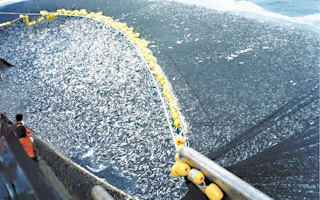Technological advances have revolutionized the global fishing industry. Depth-finders and sonar have taken much of the guesswork out of locating fish, and larger, more durable nets and trawls have drastically increased catch numbers.
However, current commercial fishing and aquaculture practices are not sustainable. The most recent edition of the State of World Fisheries and Aquaculture by the Food and Agriculture Organization of the United Nations (FAO) reports that nearly one-third of the world’s fish stocks are fished at ‘biologically unsustainable levels.’ The FAO’s 2016 report on illegal, unreported and unregulated (IUU) fishing estimates that IUU fishing brings in 11-26 million additional tons of fish each year.
Global farmed fish production surpassed beef production in 2011; however, industrial-scale aquaculture relies on wild-sourced fishmeal, which is unsustainable and further threatens wild populations.
In 2014, the U.S. Department of State’s Secretary’s Office of Global Partnerships partnered with the non-profit organization HackerNest to launch the first Fishackathon. Fishackathon brings together fish and aquaculture experts, coders and other technologists to develop innovative, but practical, tech-based solutions to the sustainability challenges facing the world’s fisheries.
This year, local groups are conducting Fishackathons in 40 cities in over 30 countries around the world on February 11-12th.
Fisheries and aquaculture experts have identified the top challenges facing aquaculture and fisheries management and submitted ‘Challenge Statements’ that summarize an issue and provide a possible tech-based solution. This year’s 11 challenges are grouped under three main themes: Enforcement, Marketplace and Sustainability.
During this weekend’s local Fishackathon events, teams will work to develop a solution to one of these challenges. Winning teams from these events move on to the regional and then global finals. In 2016, the global winner developed a water sensor that scientists can use to predict spawning times of the invasive Asian Carp in the Great Lakes region, thereby identifying high-risk areas for the species to invade.
This year, teams will tackle a variety of issues in the fishing and aquaculture industries, such as monitoring supply chains and enforcing catch quotas. Because undocumented workers are more easily exploited, one challenge addresses the lack of worker registration in small-scale operations. Another challenge aims to improve supply network transparency by creating a decision-making tool to help companies assess the risk of their activities being connected—through their supply chain—with illegal fishing or slavery.
To improve the accuracy and efficiency of fish identification and, thus, catch composition, one challenge proposes to create an app similar to iNaturalist that would use artificial intelligence-based software to identify fish to the species level, on site. Another enforcement challenge is the creation of a passive monitoring tool to detect illegal fishing activity in restricted areas to help reduce the high costs of fishery enforcement vessels and aircrafts.
You can find a complete summary of all of this year’s challenges here.
For more information or to get involved as a mentor, coder or volunteer, visit the Fishackathon website to find a local event near you. To receive updates from the 2018 Fishackathon, follow @fishackathon and #codeforfish on Twitter.
This story was published with permission from Mongabay.com. Read the full story.










